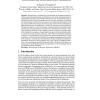FAC
2011
14 years 9 months ago
2011
UseCase-wise Development, an ‘Agile Method’ which introduces functionality into an application stage by stage, with each stage being carried through (ideally) to implementation...
141
click to vote
JLP
2008
15 years 2 months ago
2008
Abstract. Retrenchment is a flexible model evolution formalism that arose as a reaction to the limitations imposed by refinement, and for which the proof obligations feature additi...
ZUM
2000
Springer
15 years 5 months ago
2000
Springer
: Retrenchment is introduced as a liberalisation of refinement intended to address some of the shortcomings of refinement as sole means of progressing from simple abstract models t...
118
click to vote
ICFEM
2000
Springer
15 years 5 months ago
2000
Springer
Retrenchment is presented in a simple relational framework as a more flexible development concept than refinement for capturing the early preformal stages of development, and brie...
IFM
1999
Springer
15 years 6 months ago
1999
Springer
: Some of the shortcomings of using refinement alone as the means of passing from high level simple models to actual detailed implementations are reviewed. Retrenchment is presente...
107
click to vote
FM
2003
Springer
15 years 7 months ago
2003
Springer
Simple retrenchment is briefly reviewed in the B language of J.-R. Abrial [1] as a liberalisation of classical refinement, for the formal description of application developments ...
111
click to vote
TASE
2009
IEEE
15 years 8 months ago
2009
IEEE
Retrenchment is a framework that allows relatively unrestricted system evolution steps to be described in a way that gives an evolution step some formal content — unlike model b...


